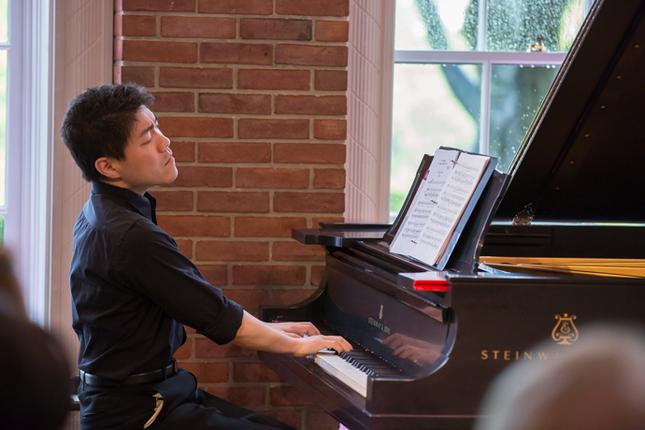Ryo Yanagitani: Multifaceted Ambassador
By • April 23, 2015 0 1506

Part of the job description for the S&R Foundation’s Artist-in-Residence is to be a multifaceted ambassador to the Washington cultural world, explaining, performing, presenting and representing the goals and results of the foundation.
Grounded in its purchases in Georgetown of Halcyon House and the Evermay estate, S&R “works with its partners to encourage social, scientific and artistic innovation, and to promote cultural and personal development.”
The young Canadian pianist Ryo Yanagitani is just about the best kind of ambassador any organization or institution could have. Affable, enthusiastic, articulate and brimming with enthusiasms and energy, Yanagitani is the foundation’s first resident artist, and he’s still here, teaching, playing, bringing his considerable gifts to the community at large.
“I thought at first it was supposed to be a one-year thing, which artist-in-residence stints often are,” he said. “Well, I’m now heading into my third residency, and it’s been an amazing experience.”
According to Kuno, the S&R Foundation’s Artist-in-Residence program “is meant to not only give selected emerging artists a home and place of inspiration, but also to provide a platform for collaboration among young musicians from around the world.”
Listening to Yanagitani, you get a sense of both his background and his heritage. He’s 36, looks at least a decade younger and combines an electric curiosity with a clean, friendly formality and charm. “I’m glad to be continuing the residency,” he said. “It gives me a chance to explore myself as an artist, a pianist, a professional and a human being,” he said.
His parents emigrated from Japan to Canada, specifically Vancouver, that far-west city that seems to a visitor a 21st-century, self-consciously livable city.
Yanagitini has a master of music degree from the Yale School of Music, where he studied under Boris Berman, and has completed the residency portion of his doctor of musical arts degree. He has recorded (an album of Chopin), he’s a member of the Music à la Mode new-music ensemble in New York and collaborates with cellist Jacques Lee Wood.
His collaborative and outreach work has included master classes for piano students at Duke Ellington School for the Arts.
Yanagitani is a key part of S&R Spring Overture Concert Series. On April 15, the concert series continues with S&R Washington Award grand-prize winner Tamaki Kawakubo, conductor and double bassist Nabil Shehata and the Evermay Chamber Orchestra presenting an evening of Tchaikovsky, Barrière and Vivaldi, including the classic “Four Seasons.”
Yanagitani will perform cabaret and musical-theater selections with mezzo-soprano Annie Rosen on April 24; works for flute and piano with flutist Lorna McGhee, who will play some of the Library of Congress’s rare instruments, on May 1; and works for violin and piano with violinist Sayaka Shoji on May 12. On May 16, he will close out the spring season with a solo recital of works by Rachmaninoff.
In addition, sister and brother Melissa Margulis, violin, and Jura Margulis, piano, will perform on April 21 and the Mark Meadows Jazz Quartet on May 8.
Since its inception, the series – staged in the intimate and graceful salon at Evermay –has become increasingly diverse and ambitious in its programming.
“Music is changing,” Yanagitani said. “It’s a complicated world, and you have to be aware of what you can do in making a career out of music, how to explore your gifts while making a living in performance. It’s a little like walking on eggshells.”
He loves being in Washington, and in Georgetown, although he lives with friends in Bethesda. “It’s such a diverse area, so many things going on, and I think there is an audience that’s out there that’s really appreciative. In the setting at Evermay, the connection to the music becomes both intimate and visceral. You can talk about the music a little. But you haves to spread your wings,” he said. “I’ve even explored a little tango music, and lately, I’ve discovered American musicals: ‘Wicked’ and ‘Miss Saigon,’ for instance.
“I happen to love the romantic and classic period of the 19th century,” Yanagitani will tell you. “But one of the things about making music your life is you have to, and should, broaden your interests. I’ve played piano since I was a child, practically, and to me, it’s always been an intimate, intense experience to play, to learn, to live that life.”

